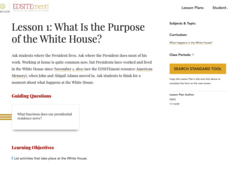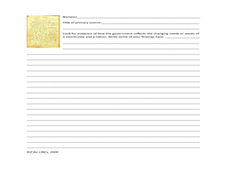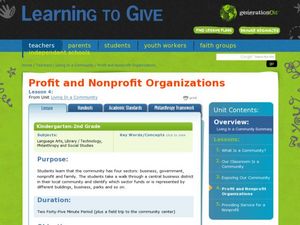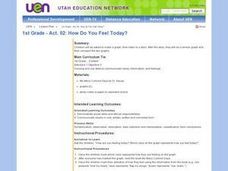Curated OER
Dr. Fix-It Subjects: Health, Government
Help your high schoolers undertand the critical problems around healthcare. By focusing on the political and private process of healthcare, students will watch a video, analyze issues, and write an essay on their findings. Additionally,...
Curated OER
Lessons from the Holocaust
Students discover what a dictatorship is by examining the holocaust. In this government activity, students discuss the laws that were enacted for Nazis to take control of Germany, and the types of laws we have put place to prevent...
National Endowment for the Humanities
Lesson 1: What Is the Purpose of the White House?
Pupils view images of presidents working and living at the White House. They list activities that take place at the White House and discuss the many purposes of the building.
Curated OER
The Odds of Dying During a Plague
Sixth graders explore plagues in the middle ages. In this social studies lesson, 6th graders examine the impact of deadly plagues on past societies and how the governments were forced to make drastic changes in response to the plagues
Curated OER
Structure Practice: The Passive Voice
Use this online interactive learning exercise in an ELD class or for younger native speakers. They practice using simple past tense verbs in the passive voice. Many of the constructions are not straightforward, nor often used by early...
Constitutional Rights Foundation
Puritan Massachusetts: Theocracy or Democracy?
Was Puritan society governed as more of a theocracy or democracy? After comparing and contrasting a series of primary source documents, middle and high schoolers form small groups and debate the question.
Curated OER
Towards Separation of Church and State in Gloucester
Explore New England government in the 1700's with your class. They will identify historical documents as primary or secondary sources, then read and discuss the significance of these documents as they relate to the "freedom of religion"...
Japan Society
Changing Times, Changing Styles: New Japanese Literary Styles of the Late Nineteenth Century
Focusing on Doppo's "Unforgettable People" and late nineteenth century Japanese literature, this resource also leads to discussions of form being dictated by content. Explore the development of new literary styles first-hand by...
Curated OER
Lesson: Allison Smith: What Are You Fighting For?
Trench art is a nontraditional art form created by soldiers in trenches during wartime. Artist Allison Smith connects her art to the American Revolution and the question: "What are you fighting for?" Kids examine her art, how it connects...
Curated OER
Beginning Your Inquiry
If you're starting a research project, use this guide to help young learners form the inquiry for their research. With steps that outline the entire process, including note taking and gauging the quality of an inquiry question, this...
University of North Carolina
Plagiarism
As many unfortunate journalists have learned, taking someone else's ideas and passing them off as your own is never a good idea. It's called plagiarism—and it's a big deal. Thankfully, a handout helps writers learn how to avoid...
K12 Reader
Import/Export
The reading passage here uses the example of the American colonies to introduce imports and exports. After reading the text, class members respond to five questions, which require pupils to find facts in the text and form opinions...
Curated OER
The False Parliamentarism of 1791 (3rd Canadian constitution)
Students gain an understanding of the concept of false parliamentarism after the Constitutional Act. They, in groups, represent different members of government as they draft, debate and try to pass a bill into law.
Curated OER
Going Greek
Third graders learn about the life of a young boy in Greece and all about his cultural heritage. Pupils gather information about the history, culture, and the many influences the ancient Greeks had on modern day society. Terrific video...
Curated OER
Using Graphology to Teach Traditional Writing
Introduce your class to the narrative, descriptive and expository forms of writing. In groups, they discuss the personality of the author while graphing the characteristics after reading different examples from the same writer. To end...
Curated OER
Learning from the Past: A New Approach
Young scholars research nonprofit organizations. As they research, they learn how those living in the colonial period formed community organizations to provide for the common good of their society. Each pupil chooses one organization to...
Curated OER
Art and Propaganda
Young scholars examine the types of propaganda used throughout World War II. In groups, they view examples of different posters and artwork used to identify the human emotions the government was trying to appeal through. They develop...
Curated OER
Living in the Community
Students explore the differences between the four sectors of business. In this nonprofit business lesson, students give examples of needs met by businesses and the importance of the community nonprofit sector.
Curated OER
"State of Emergency in Nepal"
For this grammar worksheet, learners read the story "State of Emergency in Nepal" and fill in the fourteen blanks with the correct form of the word given in bold.
Curated OER
Let the Campaign Begin
Students differentiate between positive and negative personal attributes and select a fictional character for nomination who personifies the qualities of a good leader. They use the Internet to learn about the election process and write...
Curated OER
Montreal Drivers: A Negative View
In this negative verb forms worksheet, students complete a 15 question multiple choice on-line interactive exercise. Students read a sentence about bad drivers in Montreal. Students change the verb in bold type to the negative form.
Curated OER
Singular and Plural Exercise
In this singular and plural nouns learning exercise, students fill in the blanks in 23 sentences with the correct forms of the listed nouns.
Curated OER
How Do You Feel Today?
Students create a graph, then listen to Dr. Seuss' book, My Many Colored Days. After the story, they do a similar graph and then compare the two graphs.
Curated OER
Hidden Science in Colonial Living
Fifth graders evaluate evidence that indicates a physical change has occurred. In this colonial living lesson, 5th graders explore the science involved in the making of items used in colonial life, such as, bread, butter, soap, candles,...























